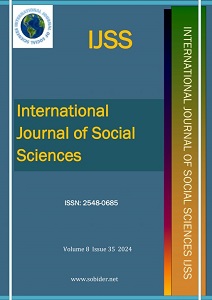Abdünnafi İffet Efendi’nin Tercüme-i Adâb-ı Gelenbevî Adlı Eserinin Türkçe Yazılma Sebebi ve Türkçe’ye Katkısı
The Reason for Writing Abdunnâfî İffet Efendi’s Tercüme-i Adâb-ı Gelenbevî in Turkish and Its Contribution to Turkish
Author(s): Sultan Temel Çitak, Sead IbrićSubject(s): Logic, Islam studies, Religion and science , The Ottoman Empire
Published by: SD Yayınevi
Keywords: Abdunnafi İffet; Gelenbevi; Logic; Debate;
Summary/Abstract: İsmail Gelenbevi (1730-1790) was a scholar who not only wrote works on logic in the last period of the Ottomans, but also on mathematics, astronomy, theology and Sufism. Adab-ı Gelenbevi, translated by Abdünnafi İffet Efendi and the subject of this article, is considered to be one of the last works on logic in the Ottoman period. Since each work addresses its own period, it has become difficult for the next generation to understand. The need to translate Gelenbavi’s commentary stems from the importance of understanding him. This is because it is important in terms of revealing the differences of opinion on logic until his own time. In the introduction of the work, al-Gelenbevi establishes the relationship between the science of logic and grammar and religious sciences. He tells us the importance of language and that it is impossible to understand other sciences without logic. Thus, the necessity of translating this work on logic becomes apparent. Abdünnafi Efendi felt this need and translated it into Turkish to reach a wider audience. While the work explains the science of logic, it also gives information about the meaning of concepts and grammatical structure. This article discusses why Adab-ı Gelenbevi was written in Turkish and the value it adds to Turkish. İsmail Gelenbevi (1730-1790) was a scholar who not only wrote works on logic in the last period of the Ottomans, but also on mathematics, astronomy, theology and Sufism.
Journal: Uluslararası Sosyal Bilimler Dergisi
- Issue Year: 8/2024
- Issue No: 35
- Page Range: 290-300
- Page Count: 11
- Language: Turkish

